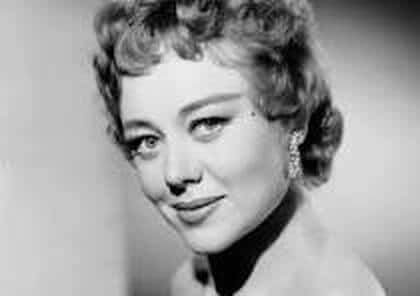Ruth Leon recommends… Glynis Johns – Send In The Clowns
Ruth Leon recommendsGlynis Johns – Send In The Clowns
Glynis Johns also died this week and, no, she wasn’t a friend of mine but I admired her very much, not because she made it to 100 but because she was a fine actor of the second rank who made the most of what she had.
She was not the first nor even the second choice for the role of Desiree in the first production of A Little Night Music in 1973. Stephen Sondheim had never heard of her before Hal Prince cast her, primarily for her ability to play light comedy. Nobody knew she could sing until, during rehearsals, she complained that all the other leading characters had a solo song and could she please have one too? Hal Prince thought she could carry it, “She had a small but silvery voice that was musical and smokily pure”.
Sondheim wrote Send In The Clowns overnight tailored to her limitations which were principally her inability to sustain a note, and played it for her the following morning. Short lines, more questions than lyrics. He said that once he worked out what her strengths were, the song almost wrote itself.
It became his only ever chart hit, recorded by Frank Sinatra, Barbra Streisand and more than 50 other singers and when they came to make the cast recording of A Little Night Music Glynis accomplished it in one perfect take.
Sondheim wrote later, “I’ve heard it sung by many fine singers (I’m happy to say) but to me her version is still the most satisfying.”
Here she is, with the song that made her, and to a degree Sondheim, famous, and how her skills as an actor, rather than a singer, triumph in this performance with Len Cariou.






I discovered in my distant youth that the best days to get cheap tickets for Broadway shows were when a holiday occurred on a Saturday or, better, a Wednesday. On 04 July 1973, the City was dead, and I nabbed a balcony seat at the Schubert for something like $2 at the TKTS booth (in those days, a caravan parked at 47th Street); I saw a Wednesday matinee of the new show „A Little Night Music“.
It provided a turning point in my life, part of the passage into the next step of maturity that I first felt when I saw „2001: A Space Odyssey“ in its original release.
I loved the show so much I returned to it seven times over the following year. Glynis Johns stayed with the show when it moved to the Majestic (as did most of the original cast), and remained a marvel. The embedded video clip casts only a shadow of how she was capable of mesmerizing 1.400 people with the tune Sondheim created for her abilities. It was magic at every performance.
What is omitted from the brief article here is that among the six Tony Awards given to „A Little Night Music“ was Best Actress in a Musical: Glynis Johns.
(Somewhere in my home office, which I now refer to as The Archives, is a Playbill autographed by Hermione Gingold.)
“Nobody knew she could sing…..” ?
Hadn’t millions of people heard her sing as Mrs. Banks in the movie MARY POPPINS ?
“Although we adore men individually, we agree that as a group they’re rather stupid.” Old Uncle Walt had a way of slipping some mildly progressive material into his “Disney Versions.”
As charming and mesmerizing a presence as Ms. Johns was, her singing ability remains a topic for debate. Glynis Johns was a great performer and presence, perhaps a higher category than being merely a musician or actor. She connected with an audience, much as Angela Lansbury, Hermione Gingold, or even Bette Midler, all much-admired ladies of the stage with limited vocal ability.
With all due respect for Ms. Johns’ career, and the knowledge that the occasion of her recent passing was the reason Ruth Leon recommended this clip, I much prefer, in thinking only of the song itself, the rendition by Jean Simmons in the mid-1970s original London cast. Compared to Johns, better tunefulness in the voice, less “gravel” or slight barking of the notes, and in my opinion a generally more emotionally affecting presentation. The character, Desiree Armfeldt, is a woman of a certain age whose best stage performing days are probably behind her but whose glamour is not. I think Simmons captures that.
https://www.youtube.com/watch?v=dVSXiGfgq-g&t=2836s